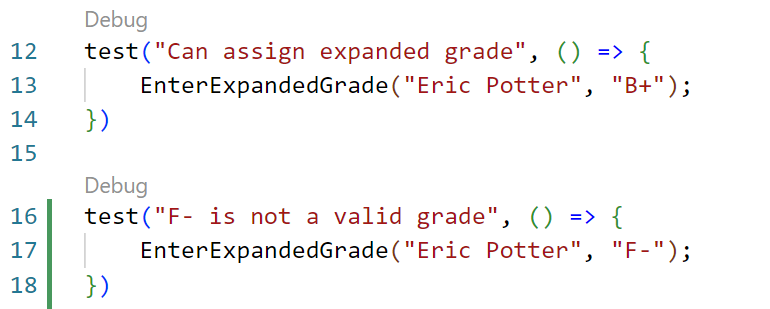Customizing TypeScript String Types with Template Literal Types and Utility Types
TypeScript has an interesting feature that lets you define a type for a subset of valid strings. These are called String Literal Types. String Literals are a special kind of Union Type. At first glance, this looks similar to an enumeration. But enumerations use numbers as their underlying storage. String Literals maintains all of the behavior of strings.
If I define a String Literal as I did on line 1 above, I have a type, named Grade, that can only be ‘A’, ‘B’, ‘C’, ‘D’, or ‘F’. So if I try to pass an ‘E’ as an argument to function that takes a Grade as a parameter, I will get a compiler error, as shown on line 8 in the example below.
It is important to remember that these checks are only run at compile time and cannot be used directly for run-time concerns like input validation.
String Literal Types can be very useful when writing DOM manipulation functions. You may have a function that is designed to only work with a subset of tags. You could create a String Literal type for that subset and ensure the function is only called with the appropriate tag names.
Template Literal Types
Template Literal Types, introduced in TypeScript 4.1, take this concept even further. Instead of needing to specify every valid value, they can be generated from String Literals. In the example below, we define a second String Literal called GradeModifiers. Then we use a Template Literal on line 18 to generate every possible combination of Grade and GradeModifier.
As you can see on line 13 in the code example below, we can now enter ‘B+’ as a valid grade, which is great. But we can also pass ‘F-‘, which we don’t want to allow.
As you can see from the Intellisense pictured below, the expandedGrades type that we generated with a Template Literal generate every possible combination, which include ‘F+’ and ‘F-‘. So how do we exclude them?
Utility Types
TypeScript also provides tools to customize type definitions called Utility Types. For our purpose we want to use the Exclude operator, which can remove items from a Union Type. Since String Literals are Union Types, we can use the Exclude operator to exclude ‘F+’ and ‘F-‘ from our list, as pictured below on line 20.
With our function definition updated to use our improved type, we can still pass ‘B+’ as before. But we now get a compiler error if we try to pass ‘F-‘
Thanks to the guy at That Conference who was in my session on Advanced Features of the TypeScript type system that told me about this possible combination. It was a cool moment where I got to learn something in the middle of teaching. Thank you!
August 1, 2022
|
Tags : TypeScript
Tweet
Comments Section
Feel free to comment on the post but keep it clean and on topic.
comments powered by DisqusAbout Me
![]() My name is Eric Potter. I have an amazing wife and 5 wonderful children. I am a Microsoft MVP for Developer Tools and Technologies, the Director of Technical Education for Sweetwater in Ft. Wayne Indiana, and an adjunct professor for Indiana Tech. I am a humble toolsmith.
My name is Eric Potter. I have an amazing wife and 5 wonderful children. I am a Microsoft MVP for Developer Tools and Technologies, the Director of Technical Education for Sweetwater in Ft. Wayne Indiana, and an adjunct professor for Indiana Tech. I am a humble toolsmith.

pottereric.github.com






